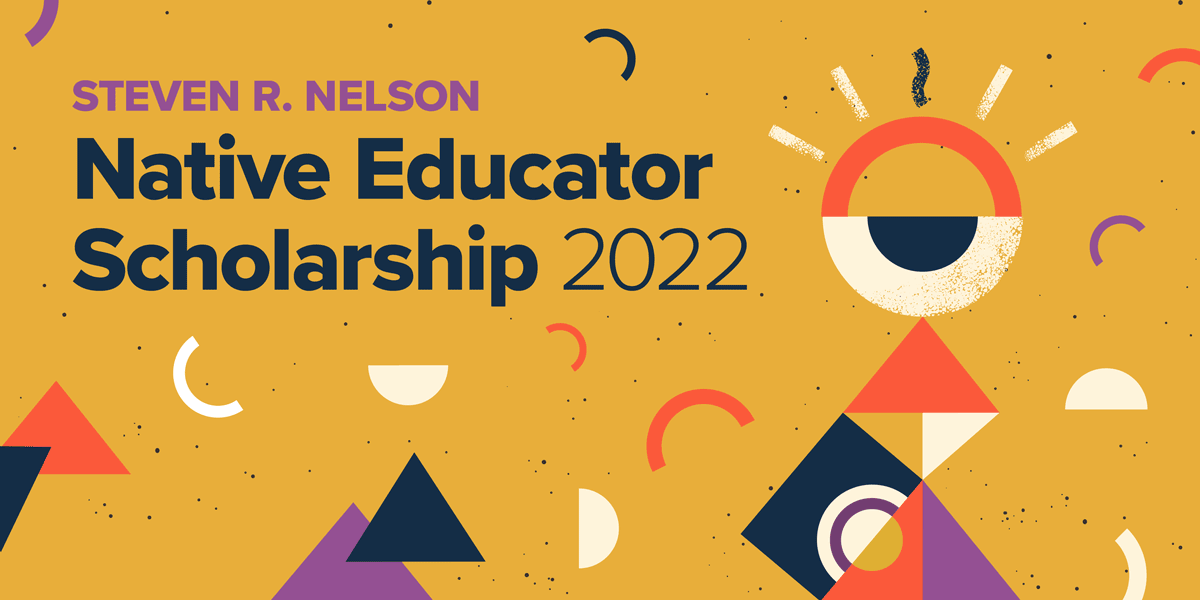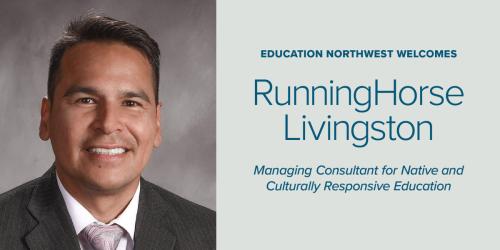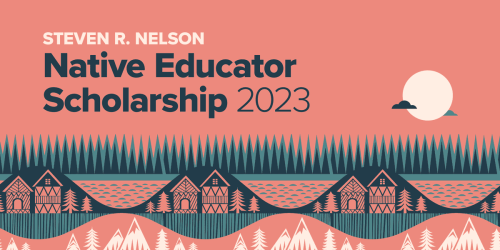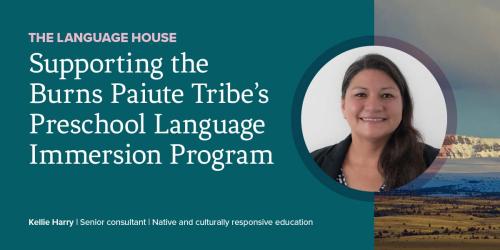The Future of Education Is Indigenous: Honoring the 2022 Nelson Scholars

Healthy Native communities are essential to the health and well-being of our world. Despite Western attempts to silence and eliminate Indigenous voices, Native educators have carried traditional knowledge into the present to sustain future generations, as well as the lands and ecosystems in which we live.
This year’s class of Nelson Scholars represent a range of efforts to infuse traditional wisdom into today’s schools–through language revitalization, community engagement, culturally sustaining practice, and policy. Each year, Education Northwest awards the Nelson Scholarship to Native students in the Northwest who are pursuing a master’s degree in education, with a goal to increase Native representation in the field.
Read more about this year’s Nelson Scholars below. Congratulations to all five recipients!
Steve Arca
Master of Education in Curriculum and Instruction, Integrative Indigenous Education — Salish Kootenai College
For 10 years, Steve has immersed himself in efforts to teach and learn Sqelixʷ (Salish) language. Steve’s best memories are learning his Tribal ceremonies, customs, history, and creation story from his grandparents, who were first language speakers. Today, he aims to help other adults learn Salish so they can teach their children at home and in school. Eventually, he hopes to start more schools for children that will teach all content in Salish.
I believe in restoring the identity of our people through language. Bringing our language back to all our people restores our culture and ensures our future.
—Steve Arca
While Steve was completing his bachelor’s degree in Salish language educator development, the Salish Kootenai College opened its master’s degree program in integrative Indigenous education. Steve knew this program was designed with him in mind. He aims to use his degree to have a voice and demonstrate his expertise to the outside world while sharing traditional wisdom with future generations.
“Our ancestors fought for us to be here today,” he said. “We owe it to them, ourselves, and future generations to continue that fight. It is possible to learn the language of our ancestors. We must never give up, ever.”
Kiana Fuega
Master of Sociocultural Anthropology — University of Washington
Kiana has long been an advocate for Native Hawaiian and Pacific Islander communities. In addition to volunteering with numerous community and cultural organizations, Kiana has centered Pacific Islanders in her work as both a student and a higher education administrator. Notably, Kiana created the annual Aspire Conference at Pierce College, which engages more than 500 Pacific Islander high school students in workshops on topics of identity, cultural empowerment, and breaking stereotypes.
My active participation and commitment to community-centered efforts are encompassed in the Samoan adage ‘e fofo le alamea le alamea’—the anecdote to the sting from the spines of the crown-of-thorns starfish are healed by using the starfish itself, referencing the pinnacle importance for seeking solutions for issues affecting a community within that same community.
—Kiana Fuega
Today, Kiana is pursuing a degree in sociocultural anthropology. She approaches her research using a cultural lens aimed at addressing disparities in education for Native Hawaiian and Pacific Islander students. Ultimately, she aims to work closer with K–12 partners to improve curriculum and engagement strategies that impact Native Hawaiian and Pacific Islander student academic performance and develop young leaders in her community who can carry this work forward.
Debbylynn Hookano
Master of Public Administration, Tribal Governance Programs — Evergreen State College
As a community organizer, Debbylynn advocates for Indigenous communities to reclaim educational pathways while honoring diverse Indigenous knowledge systems. For example, she was the lead organizer behind the movement for the city of Enumclaw, Washington, to adopt an Indigenous People’s Day resolution. While working for the Enumclaw School District, Debblynn also supported Tribal consultation with the Muckleshoot Indian Tribe to implement Senate Bill 5433, a state law that mandates the teaching of Native American history, culture, and government.
Since the majority of my work has been at the grassroots level, I have had to be aware of where current public policies fall short when it comes to our Native students and community.
—Debbylynn Hookano
With this wealth of applied knowledge, Debbylynn is now working toward her palapala (degree) in public administration. While she understands the value that Western educational and political systems place on the palapala, Debbylynn remains committed to grounding her work in her direct experience as a Native Hawaiian and a community advocate.
She said, “‘A‘ohe pau ka ‘ike i ka hālau ho‘okahi. All knowledge is not learned in just one school. One can learn from many sources.”
Melina Pastos
Master of Community and Regional Planning, Graduate Arts Management Certificate — University of Oregon
In her master’s program at the University of Oregon, Melina is learning ways to engage and empower people to become active in their own communities. She focuses on the field of equity planning, which aims to build communities where everyone has access to quality housing and education, as well as the resources they need to lead creative, healthy, and productive lives.
I am passionate about making sure that public policies and processes reflect the values, worldviews, and needs of Native peoples. We shouldn’t just have to fit into colonial systems of education, governance, and land use. I envision Native voices strongly narrating our own stories and taking the lead in promoting beauty and community well-being.
—Melina Pastos
Over the summer, Melina returned to the reservation where she grew up to intern with the local government. The opportunity gave her an inside view of issues facing the community and helped her understand how she could contribute after graduation. In finding her own path to support her community, Melina offered similar advice to younger students.
“Believe in your power to shape and reshape reality. Imagine futures for yourself and your communities that make sense to you. Write your own story and don’t be limited by those with a narrow vision of the world.”
Veronica Willeto
Master of Education in Curriculum and Instruction, Integrative Indigenous Education — Salish Kootenai College
Veronica’s motivation to attend graduate school came from her passion for the well-being of Tribal communities, especially Indigenous youth. In her master’s program, she hopes to study healing through culturally sustaining, revitalizing educational experiences in school systems as well as in the community. Veronica has a special interest in integrating oral tradition and the guidance of elders to support Indigenous students in their contemporary lives.
For Veronica, it was important to find a master’s program in which she could not only develop content knowledge but also build relationships with other Native educators who are working to advance educational sovereignty within their own communities.
I believe educational sovereignty is a determinate of the future and well-being of Tribes,” said Veronica. “Before Western philosophy of schooling and the federal Indian boarding school era, we as Native people provided high-quality education to our children. We valued the generational knowledge passed on by our elders. We set high expectations for our learners. We provided a holistic education. Educational sovereignty is needed to restore Indigenous education, to integrate Indigenous knowledge and provide culturally sustaining and revitalizing education that ensures our children are thriving academically as well as physically, mentally, emotionally, and spiritually. Every Indigenous student deserves this kind of high-quality education.
—Veronica Willeto
Applications for the 2023 Nelson Scholarship will be made available on November 30, 2022


